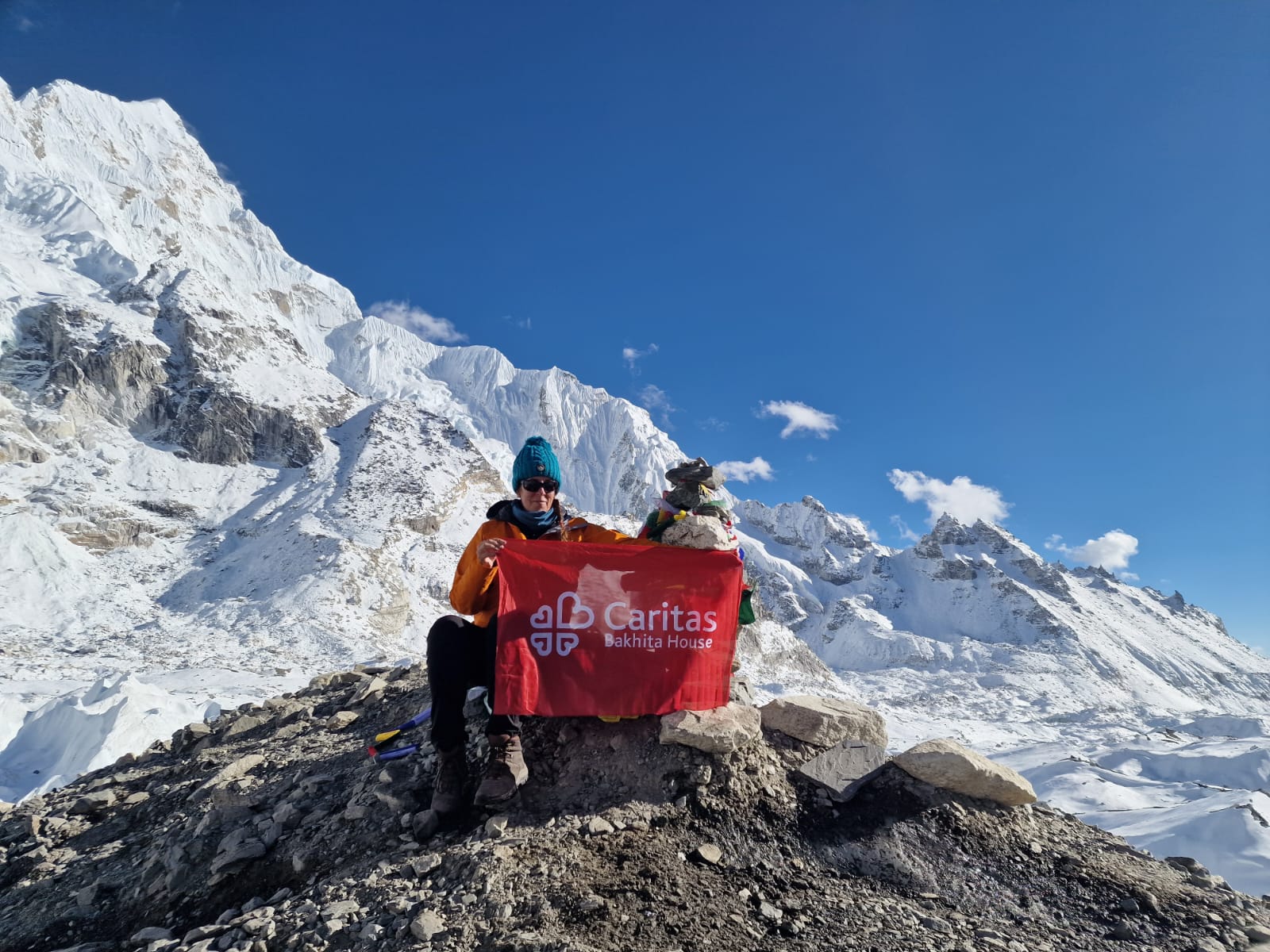Last month, we shared the exciting news about Lucy McAuley’s hike to Everest Base Camp to raise funds for Caritas Bakhita House. Having reached the summit, Lucy reflects on her experience and what it meant to her to go to #BaseCamp4Bakhita.
How did you find the hike?
The trek to Base Camp took eight days in total, which included two days for acclimatising to the increasing altitude. We began with a hair-raising internal flight to Lukla: this involved landing on a short, uphill runway at what has been dubbed world’s most dangerous airport!
From there, our trek took us through beautiful alpine valleys and Sherpa villages, across rickety suspension bridges as high as 300m, and between high-altitude monasteries and giant frozen peaks. We stayed in tea houses along our route, which ranged from being so cold that our pillows froze against the wall to the comparative luxury of a Western-style toilet (don’t ask about the alternative)!
I am an experienced trekker and completed UK and international treks to prepare for Base Camp, including climbing at altitude; even so, I was worried about the challenge of hiking for so many consecutive days in such challenging conditions. However, we were lucky with the weather, with sunshine on most days and the wind only picking up in the Khumbu Valley and at high altitude, although it was icy-cold once we approached the 5000m mark.
With the support of our fabulous team of Nepali and Sherpa guides, as well as our yaks, we had a really strong trek up to Dingboche on our fifth day. Unfortunately, the following day the majority of our group contracted food poisoning, and people started to show signs of altitude sickness. Though four members either turned back or were medically evacuated, we pressed on and finally reached Everest Base Camp, perched up at 5364m.
Many of us were very unwell on those final two days of trekking, and the next morning I was evacuated for medical treatment for food poisoning and altitude sickness, with more group members following suit in the ensuing days. Whilst I was sad that I could not trek back with the others, I was thrilled to have completed the core challenge and was comforted by the beautiful views from the helicopter!
What was your motivation for doing this trek?
I love trekking and have always wanted to climb to Everest Base Camp, but my primary motivation was to raise funds and awareness for Caritas Bakhita House, a safe house for women who are survivors of Human Trafficking and Modern Slavery. The trek was particularly important to me as Nepal is a source country for women and girls being trafficked into sexual slavery and forced labour; the thought of these women and their difficult journeys kept me going when I was unwell on the trek.
Caritas Bakhita House provides bespoke, trauma-informed support to survivors, and the dedicated team rely entirely on donations to continue their vital work. As little as £2 can help buy essentials for a women’s first night of safety and support her journey to recovery, so please do support them if you can.
The timing of the trek was also very important to me as it is in the lead up to White Ribbon Day on 25 November. I am one of the Co-Chairs of the NCI White Ribbon Staff Network Executive Committee, and I thought that this would be a wonderful way to generally raise awareness about Violence Against Women and Girls, and hopefully inspire people to get involved with the amazing activities that we have planned for the day, or the wider White Ribbon Campaign.
What would you say to anyone considering doing a similar challenge in Nepal?
The Himalayas are incredibly beautiful and the Sagarmatha National Park, where Everest is located, is sacred to the Sherpa people. However, the region has suffered from serious littering in the past, and visitors have not always respected the customs and rights of the Sherpa and other Nepalis.
I would urge anyone undertaking a trek to adhere to the ‘Leave No Trace’ principle, book via a reputable company that ensures the safety and fair remuneration of local employees, and invest in local communities by directly purchasing goods and services or donating to relevant charities.
Karen Anstiss, Head of Caritas Bakhita House, said:
We are absolutely delighted that Lucy was able to complete this impressive challenge, and are incredibly grateful for her support. Her efforts have already raised over £1,000 in donations for Caritas Bakhita House, which will enable us to continue providing round-the-clock assistance to the women in our care. Thank you from our team and especially from all of our guests.
There’s still time to support Lucy’s challenge: donate here.




